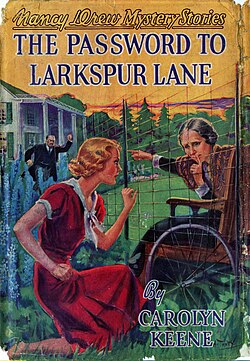 Nancy Drew is a fictional bearer of the name. | |
| Pronunciation | /ˈnænsi/ |
|---|---|
| Gender | Female |
| Origin | |
| Word/name | England |
| Region of origin | Europe |
| Other names | |
| Related names | Anne |
| Popularity | see popular names |
Nancy is an English language given name for women. The name Nancy was originally a diminutive form of Annis, a medieval English vernacular form of Agnes. In some English dialects, "mine" was used instead of "my" and "Mine Ancy" eventually became Nancy. The name was also later used as an English diminutive of Anne or Ann. It has been used as an independent name since the 18th century. [1] [2] In some instances it replaced variant Nanny, which was associated with the stereotype of a common, promiscuous woman from the 17th century onward. [3] Spelling variants in use include Nancea, Nancee, Nancey, Nanci, Nancie, Nancsi, Nancye, Nanncey, Nanncy, Nansee, and Nansi. [4] Similar names include Nan, Nance, Nanette, Nannerl, and Nannie. [5]